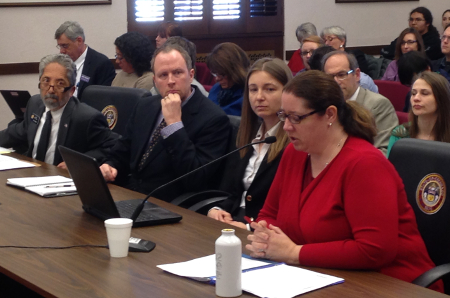By Jeffrey A. Roberts
CFOIC Executive Director
Opposition from a state agency and several local governments Wednesday doomed proposed legislation intended to modernize Colorado’s open-records law by requiring that public records kept in database formats be available to the public in similar formats.
The demise of SB 16-037, however, won’t end efforts to address long-standing problems with access to digital records under the Colorado Open Records Act (CORA). One of the bill’s opponents, the Colorado Secretary of State’s Office, has agreed to convene a stakeholders’ group to work on a possible compromise.
As we’ve written, journalists and the public are too often denied public records in in a format that allows for searching, sorting and aggregating. Public records kept in databases and spreadsheets are sometimes withheld entirely because governments say they aren’t required to redact confidential information and release public portions.

Peg Perl of Colorado Ethics Watch (right) testifies on SB 16-037 along with Katie Dahl of Colorado Common Cause and Todd Shepherd of the Independence Institute.
“I believe that records made and maintained by governmental entities belong to the public,” said Sen. John Kefalas, the Fort Collins Democrat who introduced SB 16-037. “And with exceptions that are delineated in CORA…the public must be able to access, review and analyze such records to better understand governmental activities.”
He added that some records custodians “seem to think the records entrusted to them belong to them and not to the people. I’m aware of situations where it appears that custodians have put up roadblocks to access in order to hide information or to make it harder for requesters to exercise due diligence.”
The Republican-controlled Senate State, Veterans and Military Affairs Committee killed the bill on a party-line 3-2 vote. However, some GOP members pledged to work with Kefalas on a solution, perhaps even a measure that could be introduced later in the 2016 session.
“I’m struggling with this because of the unknowns,” said Sen. Jerry Sonnenberg, R-Sterling. “…But I’ll commit to you that I’ll work with you so we have something that helps clean this up so people (in government) can’t dodge transparency.”
The bill would have required Colorado governments to produce digitally stored data “in a machine-readable standard format routinely used by the official custodian.” Custodians also would have been required to remove confidential information before making the records available. Redaction charges were to be the same as research-and-retrieval fees adopted by the legislature in 2014 (currently capped at $30 per hour with the first hour free).
Kefalas rewrote the introduced version of SB 16-037 in an effort to address opponents’ concerns about costs and the protection of confidential and proprietary information. The amendment was designed to ensure that public records custodians have no obligation to provide records in digital formats they do not regularly use.
But government lobbyists said they still had a lot of questions about the bill’s impact on costs and data security.
“This bill is addressing an important topic, but it’s not ready for prime time,” said Geoff Wilson, general counsel for the Colorado Municipal League.
Deputy Secretary of State Suzanne Staiert also testified against the bill, saying it can’t be implemented “without significant costs” to government. But after the hearing, she said her office is willing to convene a working group to keep the discussion going.
The Colorado Freedom of Information Coalition supported SB 16-037, and Executive Director Jeff Roberts testified in favor of the bill. Also speaking in support of the measure were representatives of CFOIC member organizations Colorado Common Cause, Colorado Ethics Watch and the Independence Institute.
Katie Dahl, associate director of Colorado Common Cause, testified that SB 16-037 is “trying to remove a barrier between government data and the public. The public needs access to this information in a digital format because that’s how it’s stored and used by governments.”
When governments provide long PDF documents rather than Excel spreadsheets, she said, they are “hiding information from the public about how that data is seen and used by government.”
Kefalas said his bill is “all about public trust.”
“We don’t exactly score high in the arena of public trust,” he said. “…I think we need to do everything in our power to continue to restore that public trust.”
The senator’s interest in the digital records issue stems from a request made by the Fort Collins Coloradoan for Colorado State University’s database of salaries. CSU pointed the newspaper to 145 printed pages on file at the university’s library. The Coloradoan undertook a months-long process to digitize the records so that it could analyze and report on CSU salary trends.
Follow the Colorado Freedom of Information Coalition on Twitter @CoFOIC. Like CFOIC’s Facebook page. Do you appreciate the information and resources provided by CFOIC? Please consider making a tax-deductible donation.




